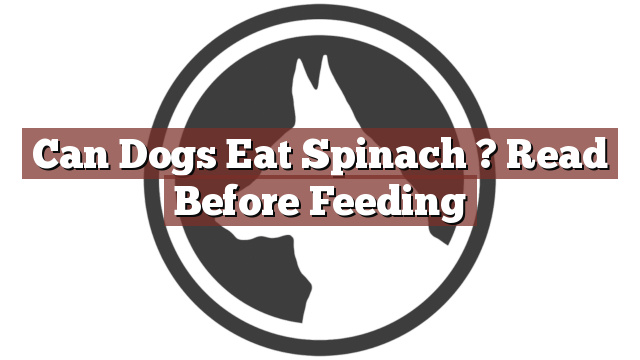Understanding Your Dog’s Dietary Needs
As a responsible dog owner, it is crucial to have a good understanding of your furry friend’s dietary needs. Providing a well-balanced and nutritious diet is essential for their overall health and wellbeing. While dogs are primarily carnivores, they can also benefit from certain fruits and vegetables. However, it is important to be aware that not all human foods are safe for dogs to consume. One common question that arises in this regard is, can dogs eat spinach?
Can Dogs Eat Spinach? Read Before Feeding
Can dogs eat spinach? The answer is yes, dogs can eat spinach, but in moderation. Spinach is a leafy green vegetable that is packed with vitamins and minerals beneficial for both humans and dogs. It is low in calories and contains essential nutrients like iron, calcium, fiber, and vitamins A, C, and K. These nutrients can contribute to your dog’s overall health and support their immune system. However, it is important to note that spinach should not be the primary part of your dog’s diet and should only be given as an occasional treat.
Pros and Cons of Feeding Spinach to Dogs
Spinach offers several advantages when included as part of a balanced diet for dogs. The high fiber content can aid in digestion and prevent constipation. The vitamins and minerals present in spinach can contribute to healthy bones, skin, and coat. Additionally, spinach is known for its antioxidant properties, which can help combat free radicals and reduce inflammation.
Despite these benefits, there are a few precautions to keep in mind. Spinach contains oxalic acid, which can interfere with the absorption of calcium and lead to the formation of kidney or bladder stones in some dogs. Therefore, it is crucial to moderate the amount of spinach you feed your dog and consult with your veterinarian to ensure it is safe for your specific pet.
In Conclusion: Proceed with Caution when Feeding Spinach to Your Dog
To sum up, dogs can eat spinach in moderation as part of a well-balanced diet. Spinach can provide several health benefits due to its nutrient-rich composition. However, it is important to exercise caution and ensure that spinach is not the main component of your dog’s diet. Additionally, it is advisable to consult with your veterinarian before introducing spinach or any other new food into your dog’s diet, especially if they have any existing health conditions. By taking these precautions, you can incorporate spinach as an occasional treat for your furry friend while promoting their overall health and happiness.
Thank you for taking the time to read through our exploration of [page_title]. As every dog lover knows, our furry friends have unique dietary needs and responses, often varying from one canine to another. This is why it's paramount to approach any changes in their diet with caution and knowledge.
Before introducing any new treats or making alterations to your dog's diet based on our insights, it's crucial to consult with a veterinarian about [page_title]. Their expertise ensures that the choices you make are well-suited to your particular pet's health and well-being.
Even seemingly harmless foods can sometimes lead to allergic reactions or digestive issues, which is why monitoring your dog after introducing any new food item is essential.
The content provided here on [page_title] is crafted with care, thorough research, and a genuine love for dogs. Nevertheless, it serves as a general guideline and should not be considered a substitute for professional veterinary advice.
Always prioritize the expert insights of your veterinarian, and remember that the health and happiness of your furry companion come first.
May your journey with your pet continue to be filled with joy, love, and safe culinary adventures. Happy reading, and even happier snacking for your canine friend!

